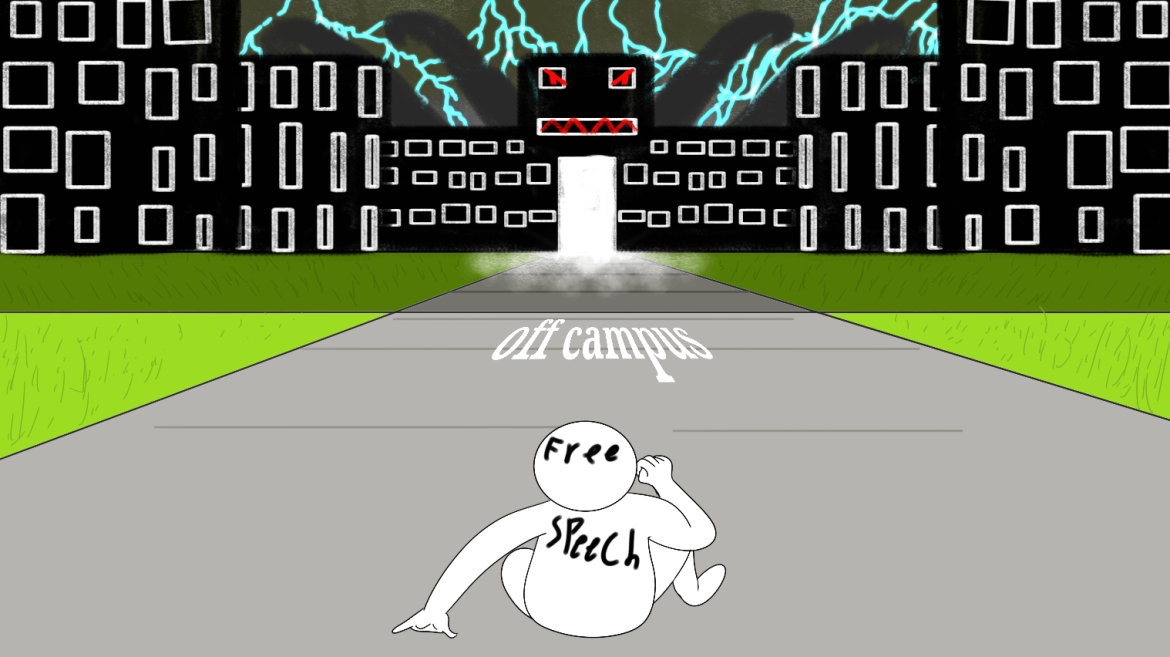A student sits in a park off-campus of their school with the school coming to attack their free speech. Schools should not have the ability to discipline students based on what they say outside of school. Illustration by Antonio Starks
Schools should not have the right to place disciplinary action on students’ speech off of the school campus.
Freedom of speech is a constitutional right in the United States, but recently students have had this right violated. A fitting example of this trend is the incident ruled on in the Mahanoy Area School District v. B.L. Supreme Court case.
In this case, a school punished a student for something they posted on their private Snapchat story after the student was not placed on the varsity cheerleading team. The school then deemed it necessary to suspend the student from the junior varsity team for the upcoming year due to their use of negative language.
The Supreme Court ruled that the student’s First Amendment rights were violated by the suspension from the cheerleading team, but students should not have to encounter disciplinary actions from their speech off of the school campus.
When a student leaves their school campus, their legal guardians are solely responsible for monitoring and setting standards for their behavior, and creating consequences for violating those standards. This is not the responsibility of the student’s teachers and school administrators.
When school administrators or teachers are not responsible for the safety of students, they should not have the ability to control or monitor what their students are saying.
“Congress shall make no law respecting an establishment of religion, or prohibiting the free exercise thereof; or abridging the freedom of speech, or of the press,” as stated in the First Amendment.
There are a different set of practices that should be followed at school and outside of school. Freedom of speech is a right that students retain at all times, but restrictions can be put in place during certain settings such as school.
When school administrators or teachers are not responsible for the safety of students, they should not have the ability to control or monitor what their students are saying. It is the student and their family’s decision for what they are able to say in the student’s freetime.
If a school feels that a student’s off-campus speech would incite or constitute bullying, it would be better to bring this up with the student’s guardians. Instead, the school should focus on fostering a positive and accepting environment within its walls, and not trying to monitor students’ off-campus opinions.
Ultimately, it is the parent’s role to set boundaries and expectations with their children as well as implement morals and values. Every person is going to have their own opinion on what is and isn’t acceptable to say in a situation and it is not the school’s job to push that onto their students if they are not under the responsibility of the school.
Instead, the school should focus on fostering a positive and accepting environment within its walls, and not trying to monitor students’ off-campus opinions.
Some people might say that it is acceptable for school administrators to punish a student’s speech off-campus out of respect for the school and its image, but everyone has the right to their own opinion and the school shouldn’t try to control that. If students decide to share their opinion, then they most likely feel passionate about it and that is their own decision to make.
The only time it should be considered reasonable to punish a student’s off-campus speech is when that speech is threatening actions against the school or other students or faculty during school hours.
According to Justice Stephen Breyer’s opinion of the Court for the Mahanoy Area School District v. B.L. case, “These (off-campus behaviors schools can regulate) include serious or severe bullying or harassment targeting particular individuals; threats aimed at teachers or other students; the failure to follow rules concerning lessons, the writing of papers, the use of computers, or participation in other online school activities; and breaches of school security devices, including material maintained within school computers.”
The school has the responsibility to take action against the extreme or violent cases in order to protect the safety of the school. However, overall, whatever a student says off-campus should be independent of school control and guidance.
